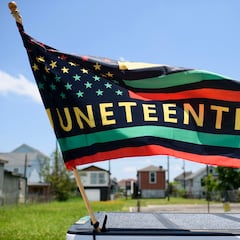Juneteenth is celebrated on June 19... but few people know the real reason
Juneteenth is the latest federal holiday added to the calendar after being approved by Congress in 2021, commemorating the end of slavery in the US.

This upcoming weekend, people throughout the United States will be celebrating Juneteenth, also called Emancipation Day, Freedom Day, Jubilee Day, Juneteenth Independence Day, and Black Independence Day. Juneteenth became a public holiday in 2021, meaning that this will be the second year it is celebrated.
When did Juneteenth become a federal holiday?
Following petitions from Democrat US Rep. Sheila Jackson Lee and Opal Lee the ‘Grandmother of Juneteenth’, who headed the campaign to designate Juneteenth as a legal, national holiday, a resolution was passed in Congress by unanimous consent on 15 June 2021 “to recognize 19 June 1865 as the date on which news of the end of slavery reached the slaves in the Southwestern States”. Bill S.475 was subsequently passed by the House of Representatives the following day, then approved and signed into law by President Joe Biden on Thursday 17 June 2021.
ON THIS DAY: In 1863, President Abraham Lincoln issued the Emancipation Proclamation, declaring that slaves in rebel states shall be “forever free.” https://t.co/lLD5blvuwx pic.twitter.com/6G9X46RZoR
— ABC News (@ABC) January 1, 2022
The origins of Juneteenth
Its history dates back to Abraham Lincoln’s Emancipation Proclamation in September 1862 – the president’s order changed federal laws to effectively free around four million African-American slaves.
However, when Lincoln issued the preliminary order to free all of the men, women and children who had been held in slavery, the country was still involved in a Civil War – and the law applied only to slaves held in the Confederate slave States of the South. The free states (Pennsylvania, Massachusetts, New Jersey and New York… etc) had technically abolished slavery much earlier (Congress had outlawed the slave trade in 1808) but millions of Black people continued to be enslaved in Southern states where the economy was dependent on free labor.
That however, all changed on 2 June 1865 following the Confederate surrender in Texas. Two weeks later on 19 June, the Union Army, led by Major General Gordon Granger entered Texas and read General Order No.3 to the people of Galveston, declaring that all slaves (around 250,000) in the State, were now free.
June 19, 1865 was the date of he actual emancipation of slaves in Texas by order of Major General Gordon Granger. Read the text. Let the reality sink in. Today, Juneteenth, should be central to American memory and conscience. pic.twitter.com/lIZvSmo2iy
— Albert Mohler (@albertmohler) June 19, 2018
Related stories
In 1866, 19 June marked the beginning of a tradition that continues to this day. The celebrations originally consisted of a prayer service, a reading of the Emancipation Proclamation, a feast featuring barbecued meat, pies, and Texan red soda, as well as games, rodeos, and dances.
Emancipation Day, marking the end of slavery has been a state-sponsored holiday in Texas since 1980. Other states followed suit, but it wasn’t until June 2021 that Juneteenth legally became a federal holiday - the 12th of the calendar year. South Dakota became the last state to make 19 June a legal holiday.


Complete your personal details to comment